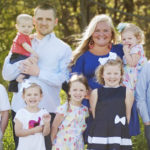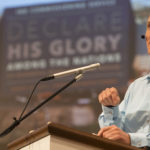SAN ANTONIO—Although nine years at Baptist Theological Seminary in Ruschlikon, Switzerland, marked less than one-third of his missionary career, John David Hopper’s name forever will be linked to the school.
But had it not been for a seemingly chance meeting over dinner at Glorieta Baptist Conference Center in 1965, Hopper could have served out his missionary tenure thousands of miles away in either Japan or Brazil.
Hopper was the ninth president of the seminary, serving from 1988 to 1997. He and his wife, Jo Ann, spent 32 years as missionaries, mostly in Eastern Europe. They worked to build churches and bridges of understanding and cooperation and spread the gospel of Jesus Christ.
Now retired in San Antonio, where he is recovering from a near-fatal episode with colon cancer last summer, the Hoppers recently reflected on their lives as missionaries and the events that changed their future and that of the seminary.
Both felt God calling them to missionary careers even before they met each other, they recalled.
Hopper, who attended Southeastern Louisiana State University, worked two summers as a Baptist Student Union summer missionary in Cuba and extended his second time there for a year, during which he served as a pastor and led the Baptist Hour choir.
Later, as a student at Golden Gate Baptist Theological Seminary, he participated in a choral group. On a choir tour in February 1958, he met his future wife, then a student at California Baptist College.
“The first thing he said to me was: ‘I am going to be a missionary. What are you going to be?’” she recalled.
She had been considering a missionary career since her time in Girls Auxiliary, the Baptist missions program for girls, she said, and responded, “I am going to Brazil.”
Sign up for our weekly edition and get all our headlines in your inbox on Thursdays
“I am going to Japan,” he replied.
They married in December 1958 and never served in either country.
While Hopper was working on his doctorate at Southwestern Baptist Theological Seminary in 1965, the couple decided it was time to renew correspondence with the Southern Baptist Convention’s Foreign Mission Board about their missionary careers.
They subsequently attended Foreign Missions Week at Glorieta, where they inquired about the possibility of going to Brazil. Hopper hoped to teach there but was disappointed to learn there were no openings.
That evening, however, the Hoppers sat by a woman in the Glorieta dining hall and told her what had happened. She asked if they would consider serving somewhere besides Brazil and inquired if they would like an appointment with J.D. Huey, the FMB vice president for Europe. Their dinner table companion was Rebecca Sisk, Huey’s secretary.
They got the appointment, and Huey initially assigned them to Italy, but the next day, he told them they needed a missionary at Ruschlikon—“someone more like Europeans.”
The Hoppers spent five years there teaching youth work and European history, and, at the request of the French Baptist Federation, recorded music in church services for use in Francophone Africa.
In the summers, they taught an English-language program that attracted many people from Eastern Europe. At a pastors’ conference, the leader of Polish Baptists invited them to a national meeting.
“We began to get a feeling for what was going on in Eastern Europe,” Hopper said. In 1970, they resigned from Ruschlikon and moved to Belgrade, Yugoslavia, where he planned to teach in a seminary at Novi Sad.
Getting a visa was a problem, however, and the Hoppers moved on to Salzburg, Austria, where they started a mission and worked in a Bible school. However, Hopper worked in many trips to Novi Sad to teach church history, missions and church growth and learned the Serbo-Croatian language.
Hopper became the FMB representative to Baptist Unions in 1976, and the couple and their three sons moved to Vienna in 1980. Working with the European Baptist Federation, he found great needs. With aid from German Baptists, he helped get pastors out of jails and worked with farmers to obtain varieties of soybeans and corn suited to their climate.
“We wanted to help them help themselves and to build trust all over Europe,” Hopper said. “Many of the people were starving, however, and we helped bring in and buy food.”
In almost every country, he went to the department of religious affairs and explained what they were trying to do. Many government offices helped them get Bibles and hymnals, because they were helping in other areas, he said. And in almost every instance, he was treated with respect and hospitality.
The Hoppers returned to the seminary in Ruschlikon in January 1988 at the request of the Europeans, who recognized their years of service.
“We went back with a vision of what could develop in the future,” Hopper said. “We wanted to see it in European hands, with the land sold and given to the European Federation. We were trying to indigenize the work.”
 |
|
The courtyard of International Baptist Seminary in Prague. The seminary moved there from Ruschlikon, Switzerland, in 1995.
|
The FMB started the seminary in 1949 with the purchase of 10 acres and a 40-room mansion. It was in almost-continuous financial difficulty, and in 1973, 1978 and 1983, an option was proposed to turn the property over to the European Baptist Federation. In 1988, the FMB provided $400,000 for support of three missionary families and $365,000 toward the school’s $1.5 million budget. The FMB approved a plan to support the seminary at that level through 1992 but gradually decrease it until 2008.
When Hopper reported in 1988 that the seminary faced more financial difficulties, a committee of FMB trustees went to Ruschlikon to evaluate the situation. During discussions, European representatives exercised the option to accept the property as discussed in 1978 and 1983. In October, FMB trustees voted 59-8 to deed the property to the European Baptist Federation.
In 1991, the FMB’s administrative subcommittee voted that the $365,000 designated in previous budgets for Ruschlikon be redirected to theological education in Eastern Europe and the former Soviet Union.
“It was painful,” said Hopper. “We were told about it with no warning, even though the FMB had signed a legal agreement to make it gradual. It was unbelievable. We had a real feeling of rejection.”
However, the FMB decision brought an outpouring of support from state conventions, churches and individuals. At one point, the Hoppers were handed a sack with cash and checks totaling $1.2 million. Funds also came through the FMB from individuals and churches designating their mission dollars to the seminary. Hundreds of volunteers from churches in the United States came to help.
The support was enough to get the seminary through the next year and a half, but expenses continued to mount. A survey showed the seminary could raise money but not enough. The decision was made to sell the property and move the seminary to Prague in the Czech Republic, where it would be related to the national university.
The move was accomplished in July 1995, and the seminary’s name was changed to International Baptist Theological Seminary of the European Baptist Federation. Financial problems have continued, however, and the seminary soon will move to Amsterdam.
In the midst of the move to Prague, Hopper underwent heart-valve replacement. The Hoppers had resigned from the FMB in 1992 and served as missionaries of the Cooperative Baptist Fellowship until their retirement in 1997. They live in San Antonio to be near Trinity Baptist Church, whose longtime former pastor, Buckner Fanning, and members provided great support to them.
As to their time in Europe and Ruschlikon, they said they couldn’t imagine a better way of using their talents.
“We never dreamed of being in Europe, but somehow our talent seemed to fit the situation,” they said. “God definitely called us there, and therefore, the time was not wasted.
“We had contact with so many people from so many countries. One man from the Soviet Union became the founder, leader and president of a seminary in Odessa, and many others went out to other leadership positions. A man from Ghana became president of his convention and head of the All-Africa organization.
“So many lives were affected; we really touched the world.”














We seek to connect God’s story and God’s people around the world. To learn more about God’s story, click here.
Send comments and feedback to Eric Black, our editor. For comments to be published, please specify “letter to the editor.” Maximum length for publication is 300 words.